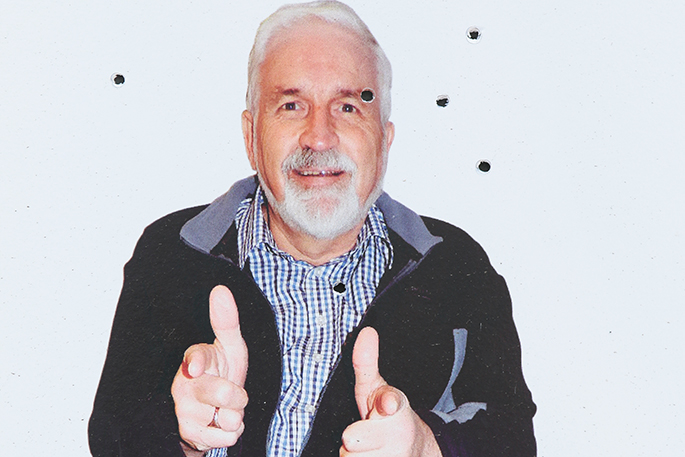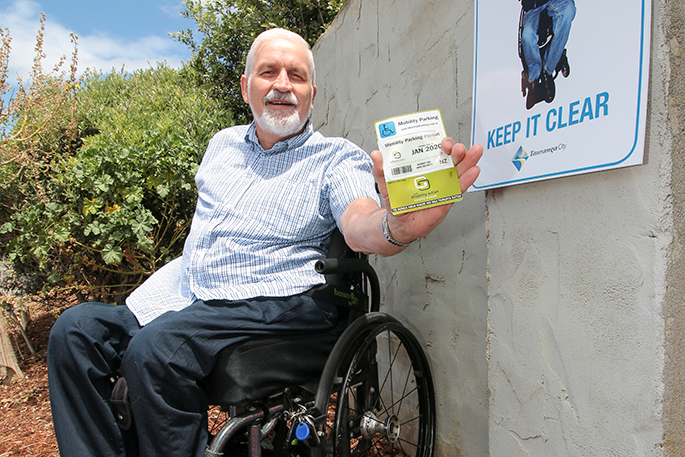His image is peppered with bullet holes. One of the shots passed clean through his left eyebrow.
”I am trying not to read anything into it,” says Paul Curry, who has for 47 years been in a wheelchair. And whose bullet-riddled picture is up there on the experimental mobility parking restriction sign. 'Hopefully it doesn't tell us anything about peoples' attitude to the disabled,” says Sean.
But it might. Because if Tauranga's able-bodied population didn't abuse the city's 133 mobility carparks, if they were more respectful and socially responsible to the city's 400 mobility park permit-holders and hadn't incurred 50 infringement notices worth $150 each in the last six months there might not be a need for the new signs.
And there might not be a need for Paul to be a poster boy and champion for social change. 'But I am big enough and old enough to do it.”
The number of violations is just representative of the problem because the Tauranga City Council parking wardens can't be everywhere all the time. And they don't have jurisdiction over mobility parks outside supermarkets and malls.

'It's a pretty selfish,” says the city's top traffic cop, Western Bay of Plenty road policing manager Senior Sergeant Ian Campion. And that's why at $150 it's an expensive misdemeanor. 'It's perceived as a particularly inconsiderate act.”
'I get the feeling people want to park directly outside wherever they are going,” says Stuart Goodman, who is Tauranga City Council's bylaws and parking man. 'It's mean-spirited, you are depriving someone of a much-needed facility, someone who really needs it.”
Someone like Paul, who is paralysed from the chest down after an accident serving his country with the navy.
'I didn't quite get to Vietnam because a 400 pound anti-submarine marine mortar came loose from a loading rope, landed on top of me breaking my back in six places.”
He's never asked for concessions. 'Never been on the benefit nor ACC, been a chief executive for a couple of government departments; tended to my own needs.”
But for the people who the permits are designed to assist, like Paul, they are an absolute blessing.
'They make a helluva difference to our lives and accessing our community. And while some people obviously see us as a lesser species, there are a lot of disabled people contributing tremendously to society and deserve respect.”
If people understood that simple message, Paul says you'd hope there might not be the same level of abuse. And Paul imploring us from the top of a sign post to 'be fair and keep it clear” may help.
There's international research showing the signs might work better than the traditional silhouette or stickman. 'When signs are personalised they tend to deter would be offenders,” says Paul. 'That's because it shows real people are affected by bad decisions.”
But those bad decisions don't stop some motorists with a sense of entitlement getting extremely niggly about mobility carparks.
'I had a real ding-dong with one woman. When I asked her where her mobility permit was she swore at me, got quite heated. Then several people stood behind me and said: ‘”ook lady, you are in the wrong here'.” Then I realised there were more good people than bad.”
And there was a ‘what the hell?' moment when a motorist towing a boat parked across two mobility parks while he popped into a hardware story for a rubber washer.
Amongst the bad are the couriers. 'They're the worst. They always say they are only going to be five minutes. And while you are driving around waiting, their five minutes becomes 10 minutes.”
There are 360 to 400 legitimate permit-holders in Tauranga. The threshold, determined by doctors, is the person's ability to walk 200m unaided and without difficulty. Then there are the hidden disabilities. 'People with heart and breathing conditions,” says the CCS Disability Action Bay of Plenty's BJ Clarke. 'The public often see these people in mobility parks and think they shouldn't be there. They don't understand.”
There was another incident at a mall where a woman took issue with an illegally parked motorist. BJ says she was subjected to a tirade of abuse, feared for her safety and had to seek the help of a mall security officer.
Stuart says there's a much higher level of abuse at supermarkets and malls because the public understands there won't be any action taken if they get caught.
'Some malls are good at enforcing mobility parking, some are not so good,” says BJ. 'Some malls don't want to upset people coming to their facilities. But they forget even disabled people have a wallet in their back pocket and want to spend money.”
The CCS is lobbying there – it wants malls to allow council parking wardens to enforce parking restrictions on their properties.
So the message from the Police, the Tauranga City Council and CCS is ‘don't'.
'If you can't park right outside where you want to go, park down the street,” says Ian. ”Walking never hurt any able-bodied person.”
'People are still of a mindset they will find a carpark right outside their destination,” says Stuart. 'That doesn't happen anymore in a growing city like Tauranga. So be considerate to other's needs. Be respectful.”
And the TCC will remain strict with mobility parks. 'They are quite clearly signed and rarely is there a valid reason to park illegally.” Either people have a mobility permit or they don't. And if they don't, they will get pinged $150.

